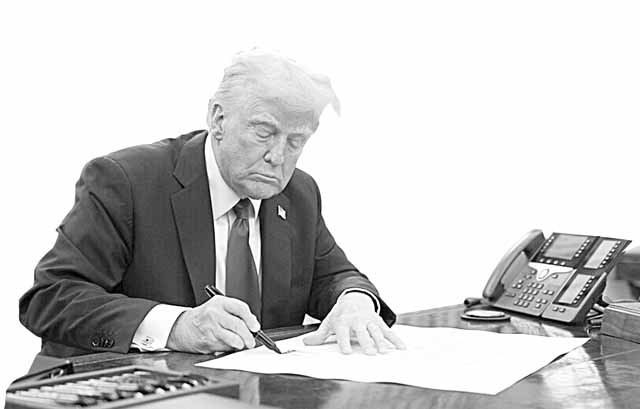By SIBUSISO DLAMINI | 2025-02-03

United States (US) President Donald Trump’s executive order suspending foreign aid is already having far-reaching consequences, extending beyond the employees of non-governmental organisations (NGOs) reliant on the President’s Emergency Plan for AIDS Relief (PEPFAR)’s support and their families.
This freeze, which affects several organisations working under the programme, is not only devastating for those who rely on its direct funding, but it is also rippling through the private sector, with businesses already facing the brunt of the immediate financial consequences.
The Sunday Observer can reveal that a number of suppliers that had running contracts with the various NGOs have already been served with correspondence to the effect that their business with them had since been suspended until further notice.
According to a communiqué seen by this publication, multiple suppliers have been instructed to cease deliveries with effect from Friday
PEPFAR has been the cornerstone of HIV/AIDS treatment and prevention in the country and several suppliers, some of whom have worked closely with non-governmental organisations (NGOs) funded by PEPFAR, have been asked to stop supplying services and goods to these organisations, with immediate effect.
Among them are caterers, cleaners, logistics providers, and other service providers who relied heavily on contracts with US-funded NGOs.
For many, these organisations represented their most consistent clients, particularly as they provided services in remote communities, where the NGOs have been deeply involved in HIV/AIDS intervention programmes.
One supplier, a catering company that had long provided services to PEPFAR-funded organisations, shared their concerns about the sudden suspension.
“This is such a huge blow to us,” said the supplier, who requested to comment on condition of anonymity.
“We have been loyal suppliers of these organisations for years, and receiving that email telling us to stop supplying was not only disappointing, but also concerning.
They were always our most consistent customers, and now we’re left wondering what to do next,” they stated, adding that the situation was likely to lead to job losses.
“We’ll have no choice but to let go of some of our staff members because we can’t maintain our finances without these contracts. For a small business like ours, this is going to be catastrophic,” they said, emphasising the negative knock-on effect on employment.
This disruption is not isolated to caterers. Other service providers and suppliers who have long relied on PEPFAR-funded organisations are facing the same uncertainty.
The immediate freeze on supplies, ranging from security services to operational support, has caused a ripple effect in the local economy, particularly among businesses in the informal and small-scale sector.
Another supplier, a logistics company providing office equipment for some of the NGOs, expressed frustration with the turn of events.
“This is very unfortunate. The country cannot afford any more unemployment. We are already grappling with high levels of joblessness, and now we’re looking at more people out of work. It’s just a sad reality for all of us,” the supplier said.
According to the suppliers, for businesses already struggling with the country’s economic challenges, this suspension is a harsh reminder of how dependent the country has become on foreign aid.
The economic burden on local businesses, they said, would likely grow as the halt in operations of organisations such as the Elizabeth Glaser Pediatric AIDS Foundation and ICAP continues to reverberate across the supply chain.
On the health front, government has expressed grave concern over the potential consequences of this freeze. Minister of Health Mduduzi Matsebula warned that the suspension of US funding could exacerbate the HIV/AIDS and tuberculosis (TB) crisis in the country – a nation that already has one of the highest HIV prevalence rates in the world.
In a statement issued earlier this week, Matsebula described the suspension as a ‘devastating blow’ that would undermine efforts to curb the spread of HIV and TB.
He highlighted that crucial programmes, including HIV testing, prevention initiatives and treatment regimens, would be severely impacted by the loss of funding.
“This will negatively affect the quality of care provided, with interruptions in clinical mentorship and the training of healthcare workers,” said Matsebula.
“The halt in funding will further reduce outreach programmes targeting key populations such as adolescent girls, young women, and men, which will ultimately lead to a rise in new HIV infections,” he added.
Government spokesperson Alpheous Nxumalo on the other hand, assured the public that efforts were underway to address the situation through diplomatic channels.
He promised that a meeting had been scheduled with the US Embassy to discuss the potential for resuming the financial aid.
Nxumalo emphasised that while the freeze was a blow to the country, the US government was acting within its sovereign right to prioritise its own national interests under the ‘America First’ policy.
“We acknowledge the devastating impact that this executive order will have on developing nations such as ours. However, we respect the right of other sovereign nations to make decisions in line with their priorities,” said the State’s mouthpiece.
Despite government’s guarantees that there would be diplomatic engagements on the matter, the suppliers said such promises without guarantees do little to address the immediate concerns of job losses and the further destabilisation of local businesses already reeling from the pandemic’s economic impact.
As news of the US funding freeze continues to make waves, the public has been vocal about their concerns.
Many echoed Minister Matsebula’s sentiments regarding the devastating impact on public health, but on the same note, complained bitterly about the country’s over-reliance on foreign aid. They stated that it has left the country vulnerable in times of geopolitical upheaval.
“I understand the frustration with the funding freeze, but perhaps this is the wake-up call we needed. We can’t keep on relying on foreign aid to solve our problems, especially in something as important as our national health. This situation has exposed how vulnerable we are as a country,” said one user
Another user echoed these thoughts, stating that it was time for the kingdom to focus on building its own capacity and resources to address critical health issues.
“We should have been working towards self-reliance, especially in areas like healthcare. Now we’re left scrambling because we didn’t plan for this,” they said. The Trump administration’s freeze on US aid is more than just a political move – it is a stark reminder of the fragile state of our reliance on foreign assistance.
For me, this crisis highlights the urgent need for Emaswati to re-evaluate its dependency on external aid and work towards a more resilient, self-sustaining future,” added the user.
share story
Post Your Comments Below
Royal Leopard …………………. (0)2
Mbabane Highlan...
The country’s national security is being jeopardised over an outstanding debt of just E5.6 ...
The reality facing African governments is that their continued dependence on international player...

Young Buffaloes ……………... (0)0
Nsingizini Hotspurs &hellip...
All material © Swazi Observer. Material may not be published or reproduced in any form without prior written permission.
Design by Real Image Internet